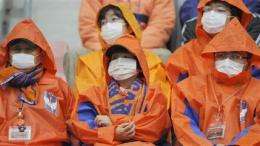WHO eyes swine flu transmision rates, new vaccine

(AP) -- Health experts are looking very closely at the spread of swine flu among people in Spain, Britain and Japan, a WHO official said Sunday as Japan reported a one-day explosion of over 70 new cases, mostly among teenagers.
The swine flu epidemic is already expected to dominate the World Health Organization's annual meeting, a five-day event that begins Monday in Geneva and involves health officials from the agency's 193 member states.
WHO Director-General Dr. Margaret Chan will reveal experts' recommendations on the production of a swine flu vaccine sometime at the meeting. Pharmaceutical companies are ready to begin making such a vaccine, but many decisions have to be made first - such as how much vaccine should be produced, how it should be distributed and who should get it.
Some experts say there's no question that a swine flu vaccine must be produced but WHO needs to discuss the issue with its members.
As of Sunday, the swine flu virus - which WHO calls the A (H1N1) virus - has sickened at least 8,480 people in 39 countries, killing 75 of them, mostly in Mexico.
Japan's health ministry confirmed dozens of new cases of swine flu in waves of announcements Sunday, prompting the government to shut down schools and cancel public events like Kobe's annual festival. By late Sunday, Japan's tally rose from five confirmed cases to 78 - many of them high school students who had not traveled overseas.
Most of the new cases involved students in the western prefectures of Hyogo and Osaka, and health officials said they were recovering in local hospitals.
Customer service workers at stores, restaurants and train stations in those two regions immediately began wearing masks as a precaution.
Japan had established strict quarantine measures at airports to try to keep the virus from spreading, but decided Saturday to shift its focus instead to containing the domestic outbreak.
WHO spokesman Gregory Hartl said in-country transmission rates were a key factor in whether the global body decides to increase its pandemic alert level. Right now, the world is at phase 5 - out of a possible 6 - meaning that a global outbreak is "imminent."
"We already know about the UK and Spain, that they have a relatively high number of cases compared to other European countries, so by simple virtue of the fact that they have more cases they need to be kept an eye on," Hartl said in an interview with AP Television News.
"There seems to have been activity in the last few days in Japan so we need to watch that too," he said.
Spain and Britain have had the highest numbers of cases in Europe, reporting 103 and 101 cases respectively. Britain announced 14 new cases on Sunday - with 11 of those being transmitted in-country - people who had not traveled to Mexico or the United States but became infected from others who had the virus.
Hartl said he couldn't tell whether the rapid spread of the virus in Japan might trigger a pandemic.
"We don't want to prejudge anything, but certainly this is something we are watching with interest," he said.
If the virus starts to be transmitted from person to person on a large scale in a country outside the Americas, this could trigger a pandemic, WHO experts have said. But it would have to jump among people outside schools, hospitals and other institutions that typically pass on such viruses quickly.
WHO estimates that up to 2 billion doses of swine flu vaccine could be produced yearly, although the first batches wouldn't be available for four to six months.
U.N. Secretary-General Ban Ki-moon will visit WHO on Tuesday and meet with senior representatives there from the vaccine industry, but the U.N. declined to say which companies.
Most flu vaccine companies can only make one vaccine at a time: seasonal flu vaccine or pandemic vaccine. Production takes months and it is impossible to switch halfway through if health officials make a mistake.
The U.S. Centers for Disease Control and Prevention is working on a "seed stock" to make the vaccine, which should be ready in a few weeks. Until vaccine manufacturers get the seed stock, they won't know how many doses of vaccine they can make or how long that would take.
WHO is also negotiating with vaccine producers like GlaxoSmithKline PLC and Sanofi Pasteur to save some of their swine flu vaccine for poorer nations. Many rich nations - such as Britain, Canada, Denmark, France, Switzerland and the United States - have already signed deals with vaccine makers to guarantee them pandemic vaccines.
A sense of urgency about preventing a swine flu pandemic helped Taiwan get a first-time observer seat on the World Health Assembly. Taiwanese Health Minister Dr. Yeh Ching-chuan said Taipei was proud to take part in the meeting for the first time in 38 years.
"Taiwan and China are both part of the world community. We should fight this disease together," he told reporters in Geneva.
China and Taiwan split amid civil war in 1949. Beijing normally objects to Taiwan's participation in international organizations but relations have improved substantially over the past year.
WHO's health assembly will run through May 22, five days shorter than initially planned because health ministries are busy fighting the swine flu outbreak.
--
Eliane Engeler reported from Geneva and Mari Yamaguchi from Tokyo. AP Television News reporter Martin Benedyk in Geneva, AP Medical writer Maria Cheng in London and reporter Jennifer Quinn in London also contributed to this report.
©2009 The Associated Press. All rights reserved. This material may not be published, broadcast, rewritten or redistributed.















